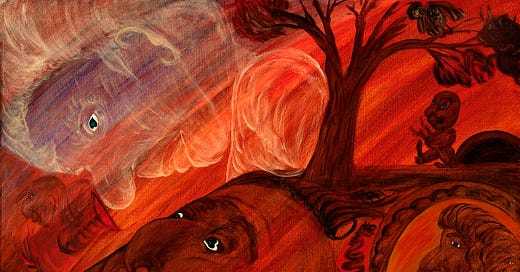
What are the dangers of sacrificing freedom of expression to the shifting social and cultural mores of the day? How can literature address corrosive sociopolitical contexts and provoke deep conversations? This week at Public Seminar, we’re proud to feature two conversations from the PEN America World Voices Festival hosted by The New School Creative Writing Program. Featuring authors Ayad Akhtar, Eloisa Amezcua, María Fernanda Ampuero, José Olivarez, Eboo Patel, and Javier Zamora.
Matters of Offense
Ayad Akhtar and Eboo Patel
From the literary world to college campuses, the relationships between art, identity, appropriation, and free speech are hotly contested. Ayad Akhtar chats with Eboo Patel about the climate of self-censorship facing writers.
Ayad Akhtar: We first met at Union Theological Seminary, maybe 10 years ago, where you gave a talk that really marked me intellectually. And the subject of your speech was reading your own religious faith by the light of other religious faiths. The examples included Dr. King’s inspiration from Hinduism and particularly Gandhi, and Muhammad’s first experience of revelation.
As the conversation around appropriation within artistic and cultural production has become increasingly—well, to me—unhinged, I think a lot about the speech that you gave, and the idea that somebody would borrow the religious ideas of another tradition to understand their own.
Eboo Patel: It is impossible to understand the Reverend Dr. Martin Luther King Jr. without the influence of Gandhi and Hinduism. When King is a student at Crozer Theological Seminary in Pennsylvania, he goes to a talk on Christian love by a great Black intellectual named Mordecai Wyatt Johnson. And Johnson presents Mahatma Gandhi as the epitome of Christian love in the twentieth century. It totally revolutionizes King’s understanding of both nonviolence and Christianity.
Is it appropriation for a Black Christian college president to frame Gandhi as a Christ-like figure? And for King to then ask the question: If this is a Christ-like figure whose approach to ending British colonialism was nonviolence, what does that mean for me as a Christian?
How We Became/Become
Eloisa Amezcua, María Fernanda Ampuero, José Olivarez, and Javier Zamora
How are we shaped by the histories, cultures, and landscapes that surround us? Authors Eloisa Amezcua, María Fernanda Ampuero, José Olivarez, and Javier Zamora explore Latinidad, identity, and love in literature.
Eloisa Amezcua: What tools did you use in your book to shed light on the history’s culture and landscape that you’re writing from or within?
Javier Zamora: I think the primary tool is voice. I wanted to show, in a subtle way, how we all learn the fucked-upness that is also part of being Latino or Latinidad. Using the voice of a kid, I included some passages about the “i” word, indio: we learn terms like that when we’re young and they become normal. And I included them as a way to self-critique, because we are taught these things from a very young age—hate speech and patriarchy and sexism. All the fucked-upness that we all learned from a very small age we carry into adulthood. Writing as a very naive kid, I wanted to show how easy it is to believe the norm, since we all aren’t born cognizant. We all don’t take ethnic studies or gender studies—sadly, it’d be great if we did—and we have to unlearn what we learn from a very small age. That became the tool that I wanted to showcase.



